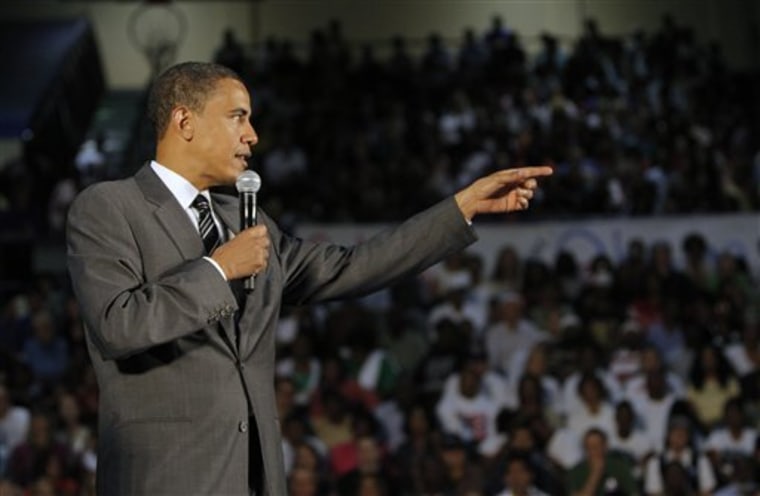Asked by a voter about accusations of flip-flopping, Democrat Barack Obama dismissed the notion Tuesday that he has been shifting stances on Iraq, guns and the death penalty to break with his party's liberal wing and court a wider swath of voters.
"The people who say this haven't apparently been listening to me," the likely Democratic presidential nominee said in response to a question at a town-hall style event.
Obama blamed criticism from "my friends on the left" and "some of the media" in part on cynicism that ascribes political motives for every move candidates make. "You're not going to agree with me on 100 percent of what I think, but don't assume that if I don't agree with you on something that it must be because I'm doing that politically," he said. "I may just disagree with you."
The Illinois senator was responding to a question from a self-described "reformed Republican" who said he worked for Democrat Bobby Kennedy four decades ago and thanked Obama for restoring "that faith."
"You had an interesting week off being accused of flip-flopping, which is mostly nonsense," the man said. He then asked Obama to restate his Iraq position, and Obama used the opportunity to dispel the idea he had changed his stances on a range of issues.
Since wrapping up the Democratic nomination last month, Obama has voiced positions that break with the Democratic Party's left and have seemed at times to shade his own past positions on a range of subjects. He's drawn criticism from some liberal Democrats who question his loyalty and from Republicans who accuse him of flip-flopping.
His remarks aside, Obama is clearly competing for the center of the electorate. Originally best known as an anti-Iraq war candidate, his latest commercials make an obvious play for voters across the political spectrum by focusing on family values and patriotism as well as "welfare to work" and lower taxes.
Over the past few weeks, he angered liberals by supporting compromise electronic surveillance rules for the government's eavesdropping program even though the bill provided immunity that he opposed last year for telecommunications companies that conducted warrantless eavesdropping. When the Supreme Court overturned the District of Columbia's gun ban, he said he favors both an individual's right to bear firearms and a government's right to regulate them.
And, he broke with death penalty opponents when he disagreed with the Supreme Court's decision outlawing executions of people who rape children.
On Iraq, he has gone from hard-line opposition to the war to more nuanced rhetoric that calls for a troop drawdown process that could last 16 months. He has said that the safety of U.S. troops and the stability of Iraq might force him to adjust that timetable — a potentially flexible formulation that has troubled liberals even though he's long said the nation needs to be careful leaving Iraq.
"I am somebody who is no doubt progressive. I believe in a tax code that we need to make more fair. I believe in universal health care. I believe in making college affordable. I believe in paying our teachers more money. I believe in early childhood education," Obama told his audience here. "I believe in a whole lot of things that make me progressive and squarely in the Democratic camp."
But, he said: "I'm not just somebody who is talking about government as the solution to everything. I also believe in personal responsibility. I also believe in faith."
So, he said when he talks about the idea of recruiting churches and other religious groups to provide community services through faith-based initiatives, as he did last week, "that's not something new. I've been talking about that for years now. I've been organizing with churches for years in the community. So the notion that somehow that's me trying to look more centered, more centrist, is just not true."
He also raised the Supreme Court ruling that upheld the rights of individuals to bear arms and said: "I actually have said that I agree with that for years, even before the ruling came down." He said that doesn't contradict his view that "we've got decent controls over the use of illegal firearms in our community."
On Iraq, he drew cheers when he said: "I opposed this war from the start" and "I have also consistently said that once we were in, we had to be as careful getting out as we were careless getting in."
